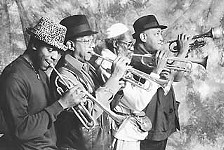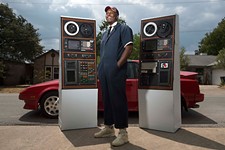Trumpet Constant Ephraim Owens Won’t Be Rushed
New Austin Music Hall of Fame inductee substitutes kindness and ubiquity for a back catalog
By Kahron Spearman, Fri., April 7, 2017
Ephraim Owens is striking.
The first thing you note about Austin trumpeter Ephraim Owens, who was voted into the Austin Music Awards Hall of Fame last month at the Moody Theater during South by Southwest, is everything all at once. His facial features are arresting: cartoonishly sleepy eyes, broad rosy cheeks, and a pointed chin accentuated by a sharp goatee. It all adds up to an inherent sweetness that maintains masculinity in both the man and his omnipresent horn.
"I've played with a lot of good ones over the years," says drummer Scott Laningham, close friend, and mainstay of Owens' outfits. "But he has a spirit about him that's special. His sense of time [demonstrates] an ability to choose when not to play, not always just when to play. That's always been a big thing about him, his use of space. His beautiful, melodic nature."
The admixture of easy physicality, tonal resonance, and warm inflection fuse trumpet/flugelhorn great Clark Terry with Owens' post-bop hero Roy Hargrove, adding dashes of flair. He sometimes plays on his toes, lifting himself forward off the page, pouring into his horn.
"I've worked with many of the best musicians on the planet," explains Red Young, frequent collaborator and world-class organist. "[Ephraim's] sense of melody, his phrasing, is one of his best attributes. He will play a phrase and let the musicians interject ideas in the musical conversation. Many players have a flurry of notes, and your role is to support the soloist.
"With him, it's more of a conversation."
Owens enjoys a longstanding residency upstairs in the Continental Club Gallery. When he's in town, that is. Generally, he's on the road, backing Sheryl Crow, Mumford & Sons, or contributing to combustible blues-rock juggernaut the Tedeschi Trucks Band, which has kept him living out of suitcases since 2015.
For all his talent, all the praise of peers and fabulous performances at Austin's best jazz haunts, something doesn't completely check. Roam for Owens on any streaming site and you'll make the discovery: He has no catalog of his own. It's a glaring hole for a busy trumpeter who's been a featured accompanist in highly visible bands for the last decade. He will not, however, be pushed into it.
"I haven't figured it out yet," he admits. "When I finally do an album, it's not going to be a straight jazz theme. I've got all the influences. All those sounds are here. That's the album I want to do. We have financial [considerations], and whatever, but time will take care of a lot of that. I don't want to force myself just because everybody says I need to make an album."
Ephraim Owens won't become prisoner to anyone else's expectations, especially given that the horn was forced on him.
But Beautiful
Ephraim Owens keeps his origins close.
"I got bullied into playing clarinet," he chuckles. "I got into a fight in the third grade, and it went further than it was supposed to. They wanted me to get into band."
Born Nov. 5, 1972, in Dallas, to a mixed household that encouraged his talents, especially him playing at their local Pentecostal church, Owens maintained a normal upbringing.
"I'm country," he says casually. "I was pretty much raised in East Texas. I was in the woods, fishing, catching snakes and stuff."
Though he enjoyed his family's full support, there were concerns about his matriculation into high school. His father, John Henry Owens, had plans for his son and his trumpet. Knowing the value of hard work through ranching and nearly four decades of aviation mechanic work, the elder Owens, who passed in 2015, felt his son's talent needed guidance.
Anticipating Ephraim might again take the Darwinian aspects of public education further than acceptable, he informed his charge that he wouldn't be attending nearby D.W Carter High School. Instead, he laid out a number of pamphlets from Booker T. Washington High School for the Performing & Visual Arts, which required potential attendees pass an audition for entry. Founded in 1892 as the first high school for black students in Jim Crow-era Dallas, the institution expanded into its current magnet-style iteration in 1976. Alumni include Erykah Badu, Willie Hutch, Norah Jones, and onetime local pianist Fred Sanders.
Though only two years his senior, Waco-born trumpet prodigy Roy Hargrove became one of Owens' personal touchstones. Aside from school jam sessions he'd witness, the latter says seeing Hargrove perform proved a transformative experience.
"I literally cried, it was so beautiful," says Owens.
Although classical music and other sounds permeate the Austinite's modulations, he credits Hargrove as his most direct influence and a champion of the state's jazz soundtrack.
"Texas and Dallas, in particular, has its own sound," explains Owens. "It's almost church music. How Roy plays, and what I think I embody, is church, funk, R&B, and jazz. That's the soul I connect with."
He attended Weatherford College outside of Dallas to play classical trumpet, before landing in San Marcos (revisit "The Inspiration of Necessity," March 5, 1999). At Southwest Texas State, he rose under the tutelage of Dr. James Polk, jazz pianist and onetime bandleader for Ray Charles. Polk also enjoys the Continental Club Gallery limelight, anchoring homegrown saxophonist Elias Haslanger's popular Church on Monday residency.
"I could tell this young man had a lot of talent," offers Polk. "He was born with that. He could have played any other instrument, and it would have been the same."
Tired of commuting from San Marcos to gig in Austin, Owens dropped out of school in 1996. He quickly became known as the traveling player, horn case perpetually in hand, ready for any occasion. Starting his own groups and performing with the capital's elite in others, including a stint with Gary Clark Jr. – Owens backed the guitarist during his national breakout at Eric Clapton's 2010 Crossroads Festival in Chicago – he ascended rapidly to the upper ranks of the city's top young guns.
During these apprentice years, he found himself on the lone full-length recording as a featured player so far in his career. Owens joined on as the junior member of a four-horn group called the Texas Trumpets alongside local legends Mark "Pat" Patterson, Donald "Duck" Jennings, and Martin Banks. Eddie Stout, blues musician and Dialtone Records owner, loved Owens' tone.
"He played well back then," says Stout, "but blues kind of escaped him."
Owens built strong relationships within the group nonetheless. He revered the Austin-born Banks (1936-2004), a character himself whose career ranged from the first Motown revue to stints with Count Basie, Duke Ellington, James Brown, Sun Ra, King Curtis, and a host of others. The young lion considered the wizened veteran something of a father figure.
"Martin Banks was the truth," emphasizes Owens. "He played like I wanted to play, that hard bop, but he could pop out these high-ass notes. I wish I would've spent more time with him. Makes me realize the importance of getting that 'old-school' in you. I mean, who's here to tell those stories now?"
Owens, actually. And not only has he grown into a storyteller, a youthful link between East Austin's horn greats and present day blowers, he's likely the last musical heir to Banks' antecedent Kenny Dorham (1924-1972) and the many players preceding the underrated Texas trumpet legend. Owens – with Gary Clark Jr. and a handful of others – could be among the last of Austin's incredible lineage of black excellence in music.
That's no small issue in any context.
Before the Music Dies
Ephraim Owens is both loved and missing.
One commonality among his local collaborators is their effusive praise for him as a person, even ahead of the player. To a man, admiration for Owens remains unmistakably palpable.
"He's got this gentlemanly, sweet quality about him," says powerhouse Austin drummer J.J. Johnson, first and current beat keeper of the Tedeschi Trucks Band. "I would say what most people pick up on when they first meet Ephraim is this certain humility about him, very considerate. First impressions are one thing, but he's pretty consistent with that disposition. Just genuine soulfulness."
Getting to know Owens during the making of mutual friend Andrew Shapter's 2006 documentary, Before the Music Dies, Doyle Bramhall II – also inducted into the AMA Hall of Fame last month – echoes Johnson. Bramhall's responsible for bringing Gary Clark Jr. to the attention of Eric Clapton. He also acted as professional matchmaker for Owens by introducing him to Sheryl Crow, who became a long-term employer.
"His kindness and thoughtfulness with others, and how you immediately feel like you're his closest friend, is so endearing in every way," says Bramhall.

Unlike most bandleaders, Owens recedes regularly, often offstage or almost out of sight. He doesn't plant down into a designated spot, but rather moves around, standing against walls or alongside other players to locate acoustic differentiations. There's some sense of theatre in the coming and going, yet the result plays out the same.
"His ability to improvise off what others are doing is incredible," continues Bramhall. "He has this ability to come up with things on the spot. Even though he's a powerful performer – and he's definitely the frontperson, and in charge – he's humble in every way. He's such a mindful player, just as a human being."
That still doesn't explain his lack of solo work, the solidification of a personal sound to disc. To be sure, he's contributed to albums by Crow, Mumford & Sons, Alejandro Escovedo, Okkervil River, even Robert Rodriguez's Sin City soundtrack. He's also demonstrated a strong songwriting aptitude, as showcased in his original gig staple "MoMoCi," an R&B/funk-flavored burner.
"We've had these conversations for years," acknowledges Johnson. "I always feel like, 'Wow, it's way overdue,' not having some sort of recorded music that represents who he is. I know at some point he wasn't fully convinced on how he wanted to represent himself, because it's a 'thing' once you make a statement. A recording is forever, so there's no, 'Well, I didn't really mean that.'"
Dr. Polk believes there's more that isn't being talked about.
"[It] comes from the standpoint of being an innovator," points out Polk. "Ephraim doesn't come from that bag. He doesn't have what I'll call the inward energy to get out and produce himself like others do. You know like, 'Let my light shine, because this is who I am.'
"He's a very good supporter, an excellent musician, [but] it takes a special talent to be a creator of what you're doing. Creators don't come along every day. Now if somebody were to say to him, 'Ephraim, I want to produce you,' he would be more than willing, and I'm sure he could find whatever it takes in order to do that.
"But, he's not the kind that wants to step out in the forefront, step out in the spotlight."
Devil in the Details
Ephraim Owens is only human.
There's a twinge, lying within the copious amounts of praise, that for all of Owens' evident goodness and unselfishness, there's a flip side – a devil in the details. As with most creative types, Owens' genius isn't without its difficulties.
"He's got his challenges and problems, just like all of us, right?" says Laningham, without being specific.
Owens isn't particularly forthcoming either.
"I have to do it," he discloses about his compulsion for music, a little fidgety, jangling his bracelet. "Man, you know music is medicine. It's the medicine for you, and me, and everybody. If not for this ...."
He trails off. Looks down. Then around.
"I don't know, I think I would get a little lonely. It's the most honest part of me, y'know? I mean, I am not lying through this."
He mocks playing his trumpet.
"I'm a little uncomfortable with this at times, but I gotta do it," he says, voice breaking.
He quickly rises from the table, citing his need for a tissue. He says it's for allergies, but he never uses them again.
One of Owens' closest associates and playing partners is Brannen Temple, a highly regarded and well-traveled drummer who's been in various now-defunct lineups with Owens, including electrifying jazz/R&B quintet Blaze and bop trio Black Red Black with Young. Initially, he declines being interviewed, saying he would "not be available at this time for info on Owens," but then immediately states that he'd be interested in speaking about "other subjects," or maybe any subject other than Owens.
"Brannen told me," discloses Owens, "'You know, it'd be cool if we had a little more direction.' Well, I don't do that. I want it to be 'whatever comes, comes.' I can treat other gigs like that, but [my Austin performances] are a freedom gig. This is when we let our hair down. Sometimes, it's like that kindness and that openness kind of gets twisted for something else."
Three weeks later, Temple showcases with Young and Owens as a trio for the latter's Tuesday night Gallery slot during everyone's touring respite. Austin 2017 is no place for jazz bands, full-on units with ample rehearsal time. Consequently, jazzers like Owens are forced to become mercenaries in a city that's more musical orgy than talent incubator.
"You have to move, and hit it hard," says Dialtone's Stout. "Austin's a good place to be from, but not a good place to make it. It's like a college: You come and jam for four years, then you get the hell out."
To this point, that day's never arrived for Owens. Though headquartering in Austin remains a given, Owens isn't one for settlement. He hasn't been married, nor does he have any children.
Perhaps that suggests stereotypical fears of commitment. Maybe it's a stubbornness against anything interrupting self-determination. Commitment to any one thing requires a certain stillness, a hard bargain for a moving target.
Even with his benevolence, there's selfishness in Owens, where he holds the innermost parts of himself to himself, simmering just below. Six regrets on one hand, a half dozen on the other.
In this way, he's "just like all of us."
Genesis 41:52
Ephraim Owens cannot be reduced.
In Genesis 41:52, Joseph names his second son Ephraim, which means "double fruitfulness," because he says, "God has made me fruitful in the land of my suffering." Owens, sounding his great horn, is the fruit of many forebears, for some, twice over.
Once one speaks to the people who've played with him, spent time in his home and known Owens, you're offered no choice other than viewing him through a glorious kaleidoscope. Nothing's cut and dry, or remotely simplified, all his appealing colors and imperfections twisting and turning together. Those closest to him have met him where he is, requiring nothing more.
"If there's a downside to what's missing from Ephraim, it's that he hasn't forced his own projects ahead of other things," says Laningham. "He's the guy who will pause and do something for a friend, ahead of maybe something that would be considered by some to be more selfish, or be more focused on his own professional development. I know he has some great records in him.
"Maybe it never happens, and if it doesn't, that would be sad," says the drummer before pausing. "At the same time, what he gives us is so rich. Not having an album wouldn't diminish him at all."











